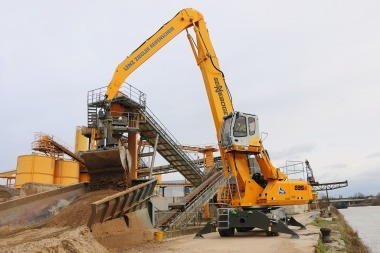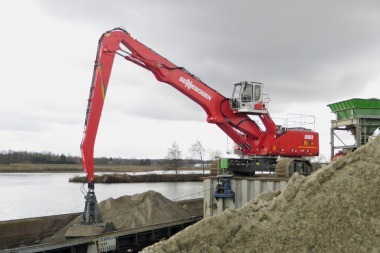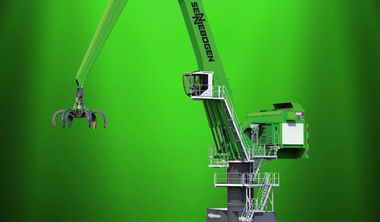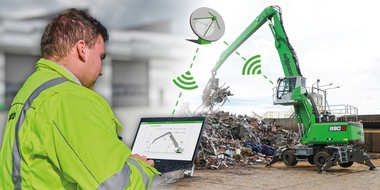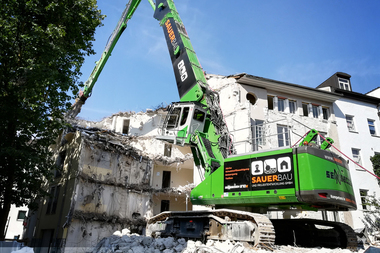SENNEBOGEN
At bauma 2025, SENNEBOGEN will be presenting a material handler for the first time that not only saves CO₂ due to its efficiency and durability, but whose steel components are also largely made of CO₂-reduced steel. In addition to high efficiency and durability, this innovation already saves significant amounts of CO₂ during production. Together with its long-standing partner DEUMU, a Salzgitter AG company, the Bavarian mechanical engineering company is driving forward the decarbonization of industry and setting new standards for resource-saving technologies.
SENNEBOGEN, the renowned manufacturer of material handling machines and crane technology, and the steel producer Salzgitter AG have been linked by a close partnership and a new, common goal for decades: the consistent development of sustainable, climate-friendly technologies.
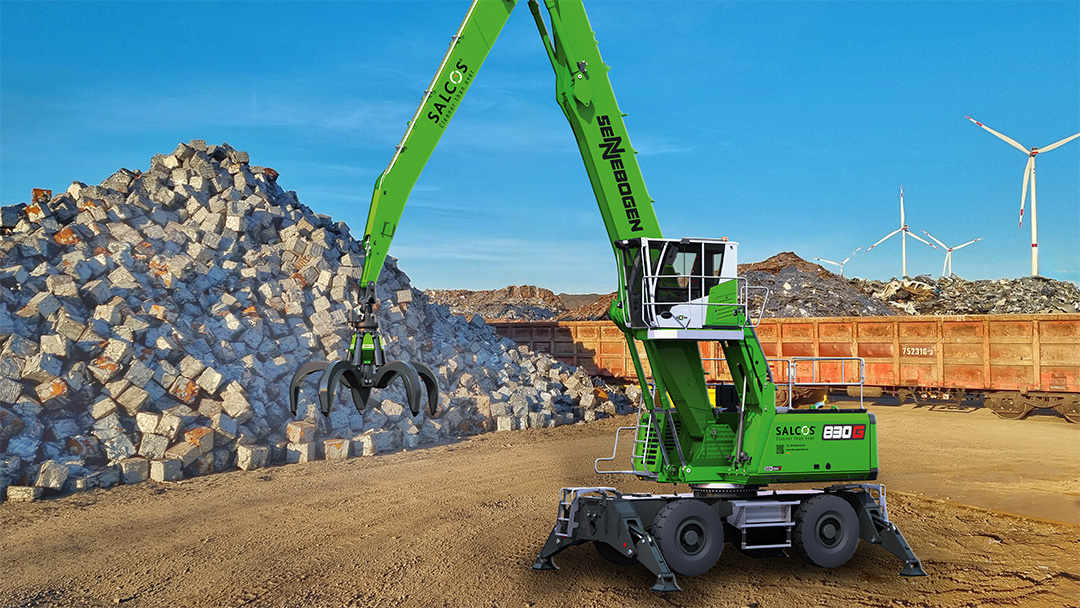 The “double green” SENNEBOGEN 830 G made of CO₂-reduced steel is a joint decarbonization project of SENNEBOGEN Maschinenfabrik and the steel producer Salzgitter AG
The “double green” SENNEBOGEN 830 G made of CO₂-reduced steel is a joint decarbonization project of SENNEBOGEN Maschinenfabrik and the steel producer Salzgitter AG
© SENNEBOGEN
Green steel as the key to climate neutrality
Salzgitter AG and its subsidiary DEUMU (Deutsche Erz- und Metall-Union GmbH) have been committed to CO₂-reduced steel production for years. Steel is an indispensable material for numerous industries, but its production causes around 7% of total CO₂ emissions worldwide. In Europe, an average of 2 tons of CO₂ is currently generated per ton of steel produced. To drastically reduce this figure, Salzgitter is focusing on the SALCOS® (Salzgitter Low CO₂ Steelmaking) transformation program. The aim is to produce steel in a “greener” way and to support customers on their way to a low-carbon value chain. By gradually converting production to low- CO₂ processes, Salzgitter AG will reduce emissions from steel production by up to 95 %.
CO2-reduced SALCOS® brand steel is already being produced today – through the use of recycled scrap and electricity from renewable sources. DEUMU used this steel to produce the steel components for the new SENNEBOGEN 830 G material handler. Compared to conventional steel production, this CO₂-reduced steel enables savings of more than 70 %.
SENNEBOGEN: Climate neutrality by 2030
The machine manufacturer SENNEBOGEN is pursuing ambitious sustainability goals and is aiming to become climate-neutral by 2030 in accordance with Scopes 1 and 2. This includes sustainable processes in the plants as well as the development of low-emission machines. SENNEBOGEN machines are known for their efficiency and modern drive solutions. A large proportion of the green machines from Bavaria are equipped with innovative energy-saving systems and efficient travel drives, which can achieve savings of 30 to 75 % in operating costs, depending on the technology and application. Managing Director Erich Sennebogen is delighted with the project: “Green steel is one of many important components for the sustainable further development of crane and material handling machine technology. If the CO₂ footprint can already be reduced in the area of primary materials, we see this as a welcome contribution - for us and our customers.”
830 G made from CO₂-reduced steel at bauma
In a joint project, the two partners are now consistently driving forward decarbonization in mechanical engineering and setting a prime example of the circular economy: from the use of recycled steel scrap to climate-friendly steel production to the finished material handler, which is returned to the steel recycling cycle at the end of its life cycle. As an example of the joint pioneering work, the 40 t 830 G material handler, which is largely made of CO₂-reduced steel, will be on display at the SENNEBOGEN stand at bauma 2025 and will go into operation in steel scrap handling at DEUMU immediately after the trade fair. “The Salzgitter Group explicitly wants to play a pioneering role here. It is therefore clear to us that we also want to use CO₂-reduced products in our scrap yard,” emphasizes Uwe Rehren, Managing Director of DEUMU. As a product development of the latest SENNEBOGEN machine generation, the new 830 G material handler also works around 20 % more efficiently and saves a further 18.5 tons of CO₂ per year in operation compared to its predecessor model.
Pioneering project in the industry
The SENNEBOGEN 830 G sets a clear example with a total CO₂ saving of 20 tons per machine. The CO₂-reduced steel has contributed significantly to this value. As the physical properties and load-bearing capacity of green steel are no different from conventional steel, the concept can be easily transferred to all SENNEBOGEN products. SENNEBOGEN already offers comprehensive implementation for all models on request - a decisive contribution to the sustainable transformation of the entire value chain in accordance with Scope 3 and a milestone for CO₂ reduction in the industry.
Stand FM/712

